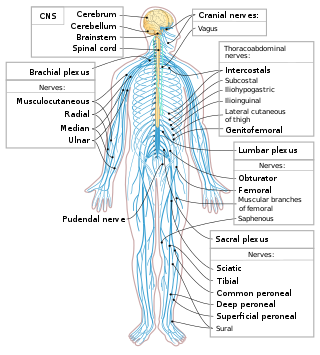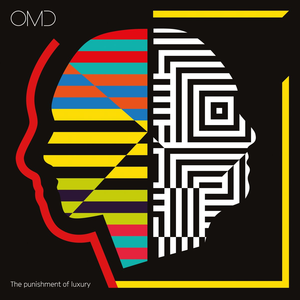A request that this article title be changed to OMD (disambiguation) is under discussion . Please do not move this article until the discussion is closed. |
OMD may stand for:
A request that this article title be changed to OMD (disambiguation) is under discussion . Please do not move this article until the discussion is closed. |
OMD may stand for:

A disease is a particular abnormal condition that adversely affects the structure or function of all or part of an organism and is not immediately due to any external injury. Diseases are often known to be medical conditions that are associated with specific signs and symptoms. A disease may be caused by external factors such as pathogens or by internal dysfunctions. For example, internal dysfunctions of the immune system can produce a variety of different diseases, including various forms of immunodeficiency, hypersensitivity, allergies, and autoimmune disorders.

A genetic disorder is a health problem caused by one or more abnormalities in the genome. It can be caused by a mutation in a single gene (monogenic) or multiple genes (polygenic) or by a chromosome abnormality. Although polygenic disorders are the most common, the term is mostly used when discussing disorders with a single genetic cause, either in a gene or chromosome. The mutation responsible can occur spontaneously before embryonic development, or it can be inherited from two parents who are carriers of a faulty gene or from a parent with the disorder. When the genetic disorder is inherited from one or both parents, it is also classified as a hereditary disease. Some disorders are caused by a mutation on the X chromosome and have X-linked inheritance. Very few disorders are inherited on the Y chromosome or mitochondrial DNA.

Orchestral Manoeuvres in the Dark (OMD) are an English electronic band formed on the Wirral, Merseyside, in 1978. The group consists of founding duo and principal songwriters Andy McCluskey and Paul Humphreys, along with Martin Cooper and Stuart Kershaw (drums). Regarded as pioneers of electronic music, OMD combined an experimental, minimalist ethos with pop sensibilities, becoming key figures in the emergence of synth-pop; McCluskey and Humphreys also introduced the "synth duo" format to British popular music. In the United States, the band were an early presence in the MTV-driven Second British Invasion.
Conversion disorder (CD), or functional neurologic symptom disorder (FNsD), is a functional disorder that causes abnormal sensory experiences and movement problems during periods of high psychological stress. Individuals with CD present with highly distressing neurological symptoms such as numbness, blindness, paralysis, or convulsions, which are not consistent with a well-established organic cause and can be traced back to a psychological trigger.
Inborn errors of metabolism form a large class of genetic diseases involving congenital disorders of enzyme activities. The majority are due to defects of single genes that code for enzymes that facilitate conversion of various substances (substrates) into others (products). In most of the disorders, problems arise due to accumulation of substances which are toxic or interfere with normal function, or due to the effects of reduced ability to synthesize essential compounds. Inborn errors of metabolism are often referred to as congenital metabolic diseases or inherited metabolic disorders. Another term used to describe these disorders is "enzymopathies". This term was created following the study of biodynamic enzymology, a science based on the study of the enzymes and their products. Finally, inborn errors of metabolism were studied for the first time by British physician Archibald Garrod (1857–1936), in 1908. He is known for work that prefigured the "one gene–one enzyme" hypothesis, based on his studies on the nature and inheritance of alkaptonuria. His seminal text, Inborn Errors of Metabolism, was published in 1923.

Isovaleric acidemia is a rare autosomal recessive metabolic disorder which disrupts or prevents normal metabolism of the branched-chain amino acid leucine. It is a classical type of organic acidemia.

Organic brain syndrome, also known as organic brain disease, organic brain damage, organic brain disorder, organic mental syndrome, or organic mental disorder, refers to any syndrome or disorder of mental function whose cause is alleged to be known as organic (physiologic) rather than purely of the mind. These names are older and nearly obsolete general terms from psychiatry, referring to many physical disorders that cause impaired mental function. They are meant to exclude psychiatric disorders. Originally, the term was created to distinguish physical causes of mental impairment from psychiatric disorders, but during the era when this distinction was drawn, not enough was known about brain science for this cause-based classification to be more than educated guesswork labeled with misplaced certainty, which is why it has been deemphasized in current medicine. While mental or behavioural abnormalities related to the dysfunction can be permanent, treating the disease early may prevent permanent damage in addition to fully restoring mental functions. An organic cause to brain dysfunction is suspected when there is no indication of a clearly defined psychiatric or "inorganic" cause, such as a mood disorder.

Rotor syndrome is a rare cause of mixed direct (conjugated) and indirect (unconjugated) hyperbilirubinemia, relatively benign, autosomal recessive bilirubin disorder characterized by non-hemolytic jaundice due to the chronic elevation of predominantly conjugated bilirubin.

Crush is the sixth studio album by English electronic band Orchestral Manoeuvres in the Dark (OMD), released on 17 June 1985 by Virgin Records. It is the first of two OMD studio albums to be produced by Stephen Hague. Aimed primarily at the US market, Crush is notable for moving the group towards a more polished sound, although elements of earlier experimentation are still present. During recording the band employed a greater use of organic instrumentation than in the past.

Universal is the tenth studio album by English electronic band Orchestral Manoeuvres in the Dark (OMD), released on 2 September 1996 by Virgin Records. Frontman Andy McCluskey opted for a more organic, acoustic sound on the record, which peaked at number 24 on the UK Albums Chart. It was generally well received by music critics, although the British media's overall resistance to OMD – who had been rendered unfashionable by the prevalence of grunge and indie rock – prompted McCluskey to dissolve the group. Universal was their last album until 2010's History of Modern.

"If You Leave" is a 1986 song by English electronic band Orchestral Manoeuvres in the Dark (OMD). It was recorded for the soundtrack to the film Pretty in Pink (1986), in which it is played prominently during the final scene. Along with 1980's "Enola Gay", the track has been described as OMD's signature song.

"One More Day" (OMD) is a four-part 2007 comic book crossover storyline, connecting the three main Spider-Man series published by Marvel Comics at the time. Written by J. Michael Straczynski and Joe Quesada, with art by Quesada, the story arc concludes the fallout of Spider-Man's actions during the 2007 Civil War crossover. "One More Day" starts in The Amazing Spider-Man #544, continues in Friendly Neighborhood Spider-Man #24 and The Sensational Spider-Man #41, and concludes in The Amazing Spider-Man #545.
Organic acidemia is a term used to classify a group of metabolic disorders which disrupt normal amino acid metabolism, particularly branched-chain amino acids, causing a buildup of acids which are usually not present.

Central nervous system diseases or central nervous system disorders are a group of neurological disorders that affect the structure or function of the brain or spinal cord, which collectively form the central nervous system (CNS). These disorders may be caused by such things as infection, injury, blood clots, age related degeneration, cancer, autoimmune disfunction, and birth defects. The symptoms vary widely, as do the treatments.

A neurological disorder is any disorder of the nervous system. Structural, biochemical or electrical abnormalities in the brain, spinal cord or other nerves can result in a range of symptoms. Examples of symptoms include paralysis, muscle weakness, poor coordination, loss of sensation, seizures, confusion, pain, tauopathies, and altered levels of consciousness. There are many recognized neurological disorders, some are relatively common, but many are rare.

English Electric is the twelfth studio album by English electronic band Orchestral Manoeuvres in the Dark (OMD), and their second since the 2006 reformation of the group. Preceded by lead single "Metroland" on 25 March 2013, it was released on 5 April by 100% Records. Unlike predecessor History of Modern (2010), which was compiled remotely via the Internet, English Electric saw OMD co-founders Andy McCluskey and Paul Humphreys write and record in person, with the aim of recreating their artistic chemistry in years past. The album was largely inspired by McCluskey's then-recent divorce.

3-O-Methyldopa (3-OMD) is one of the most important metabolites of L-DOPA, a drug used in the treatment of the Parkinson's disease.
Organic personality disorder (OPD) or secondary personality change, is a condition described in the ICD-10 and ICD-11 respectively. It is characterized by a significant personality change featuring abnormal behavior due to an underlying traumatic brain injury or another pathophysiological medical condition affecting the brain. Abnormal behavior can include but is not limited to apathy, paranoia and disinhibition.

The Punishment of Luxury is the thirteenth studio album by English electronic band Orchestral Manoeuvres in the Dark (OMD), and the third since their 2006 reformation. Produced by OMD, it was released on 1 September 2017 by 100% Records in the UK and White Noise elsewhere. In July of that year, the band commenced a tour of North America and Europe in support of the record.
Occult macular dystrophy (OMD) is a rare inherited degradation of the retina, characterized by progressive loss of function in the most sensitive part of the central retina (macula), the location of the highest concentration of light-sensitive cells (photoreceptors) but presenting no visible abnormality. "Occult" refers to the degradation in the fundus being difficult to discern. The disorder is called "dystrophy" instead of "degradation" to distinguish its genetic origin from other causes, such as age. OMD was first reported by Y. Miyake et al. in 1989.